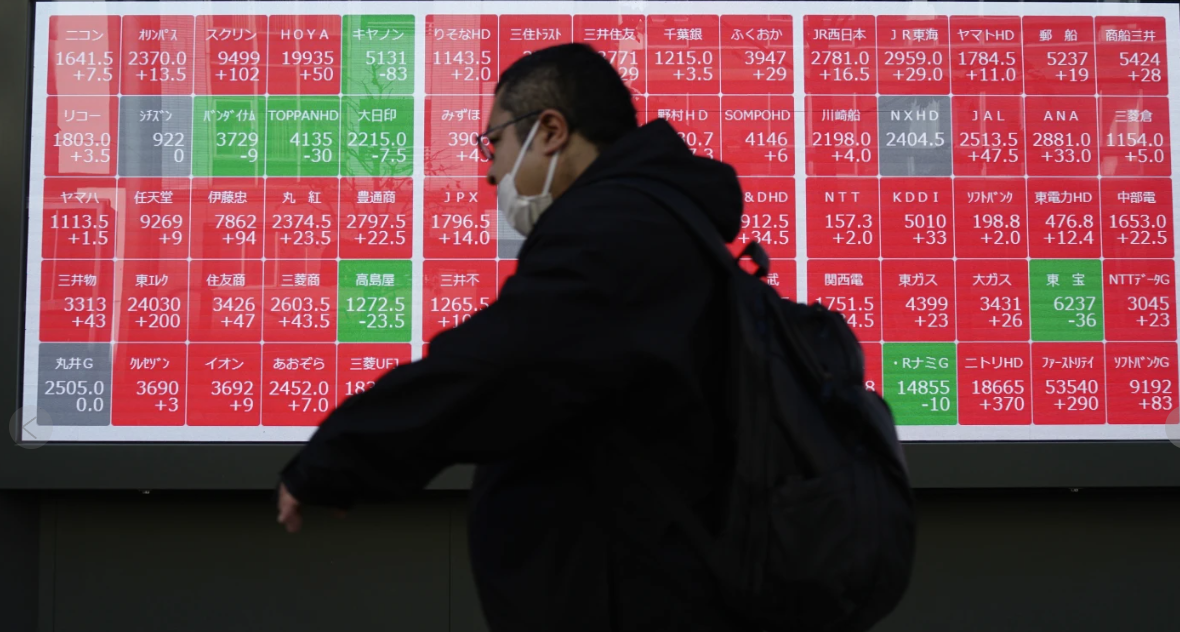Global stock markets mostly saw declines on Monday after U.S. stocks pulled back from their all-time highs, with many Asian markets closed for holidays.
In early European trading, Germany’s DAX dropped 1.1% to 21,178.37, while France’s CAC 40 fell by 0.8% to 7,863.70. Britain’s FTSE 100 decreased by 0.3% to 8,473.33.
Futures for the S&P 500 fell 1.6%, and Dow Jones Industrial Average futures dropped 0.9%.
Meanwhile, updates on a Chinese AI startup, DeepSeek, boosted shares in Hong Kong. The AI model, which is based on reasoning, seems to require much less investment than other similar models, leading investors to sell technology stocks in the U.S. and Japan, while buying shares of Chinese tech companies.
Hong Kong’s Hang Seng Index gained 0.7%, reaching 20,197.77. Shares of e-commerce giant Alibaba rose by 2.9%, and search engine company Baidu saw a 4.9% jump.
The Shanghai Composite index dropped after a survey of manufacturers revealed that export orders in China had fallen to a five-month low. The index edged down by 0.1% to 3,250.60.
The official manufacturing purchasing managers index (PMI) declined to 49.1 in January from 50.1 in December, indicating a shift into contractionary territory, as a reading below 50 signals contraction. Both new orders and construction PMIs also saw a decline.
Zichun Huang from Capital Economics suggested that the economic slowdown in China could be temporary, due to increased government spending. He also noted that many factories shut down for a period in January ahead of the Lunar New Year holidays, which begin on Tuesday.
However, Huang pointed out that the disappointing PMI data highlights the challenges policymakers face in achieving a sustained economic recovery.
In Japan, the Nikkei 225 dropped 0.9% to 39,565.80, continuing its losses after the Bank of Japan raised its benchmark interest rate to 0.25%, the highest level since 2008.
Shares related to computer chips saw significant declines, with Tokyo Electron falling by 4.9% and test equipment maker Advantest dropping by 8.6%.
The U.S. dollar remained steady against the Japanese yen, trading at 155.45 yen, slightly down from 155.72. The euro also dipped to $1.0477 from $1.0483.
In Bangkok, the SET index dropped 0.7%, while many other Asian markets were closed for holidays.
On Friday, U.S. stocks retreated from their all-time highs, marking the end of a second consecutive week of gains.
The S&P 500 fell by 0.3% after setting a record the day before, closing at 6,101.24. The Dow Jones Industrial Average also slipped 0.3%, and the Nasdaq Composite declined 0.5%.
Trading was relatively quiet, with stability in the bond market playing a role. Recently, shifts in bond market activity have been influencing stock prices. Rising concerns over inflation and the U.S. government’s growing debt have caused Treasury yields to increase, which has put downward pressure on stock prices. However, when these concerns ease, as they did after a positive inflation update last week, yields have decreased, helping stocks rise.
The earnings season for major U.S. companies has started off mostly positively, further supporting the stock market. Even though higher Treasury yields are weighing on stock prices, companies are offsetting this impact with stronger profits.
The yield on the 10-year Treasury bond decreased to 4.61% from 4.65% on Thursday. Other bond yields also fell after a series of reports on the U.S. economy came in weaker than expected.
One report showed that U.S. consumer sentiment was lower than economists had anticipated, dropping in January for the first time in six months. Another preliminary report indicated that U.S. business activity was also weaker than expected. However, a third report offered a slightly more positive note, revealing that sales of previously owned homes were somewhat stronger than anticipated last month, following the worst year for such sales since 1995.
Despite the weaker economic data, traders do not expect the Federal Reserve to lower its key interest rate during its meeting next week. According to CME Group data, it is almost certain the central bank will keep rates unchanged.
In early Monday trading, U.S. benchmark crude oil dropped by 25 cents, settling at $74.41 per barrel, while Brent crude, the international benchmark, fell by 29 cents to $77.26.














